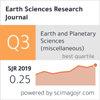Estimation of soil losses due to water erosion in the Dagua River Basin, Colombia
IF 0.5
4区 地球科学
Q4 GEOSCIENCES, MULTIDISCIPLINARY
引用次数: 0
Abstract
The Dagua river basin, in Colombia, is the most important source of water for the Valle del Cauca ecosystem, however, due to poor agricultural practices, it has been affected by water erosion. This study aimed at estimating soil erosion in the Dagua river basin, using the universal soil loss equation (USLE). The results show that most of the area presents erosivities that are between 1000-5000 MJ.mm.ha-1, corresponding to low and very low categories. On the other hand, erodibility ranged from 0.143 to 0.842 t. ha.h. MJ-1 mm-1 ha-1, which is framed in the categories from weak to extremely erodable, where the low to medium category predominates. Regarding soil losses due to erosion, it was found that more than 20% of each of the municipalities of Dagua, Restrepo, La Cumbre, and Vijes, showed high and very high erosion, particularly in the areas with bare soils and crops such as pineapple, contribute strongly, sometimes reaching over 1000 t ha-1 yr-1. Therefore, it is important to promote practices such as contour or contour planting, integrated crop cover management, land uses that integrate trees, and in more critical cases to consider ecological restoration processes.哥伦比亚达瓜河流域水土流失估算
哥伦比亚的达瓜河流域是考卡山谷生态系统最重要的水源,但由于农业实践不善,它受到了水土流失的影响。本研究旨在利用普遍土壤流失方程(USLE)估算大瓜河流域的土壤侵蚀。结果表明,该地区大部分地区的侵蚀力在1000-5000 MJ.mm.ha-1之间,对应于低和极低类别。另一方面,可蚀性范围为0.143至0.842 t.ha·h。MJ-1 mm-1 ha-1,分为弱可蚀性至极易蚀性类别,其中低至中等类别占主导地位。关于侵蚀造成的土壤损失,研究发现,达瓜市、雷斯特雷波市、拉康布雷市和维耶斯市各有20%以上的城市表现出高度和非常高的侵蚀,特别是在土壤裸露的地区,菠萝等作物的侵蚀贡献很大,有时达到1000吨ha-1 yr-1以上。因此,重要的是推广等高线或等高线种植、综合作物覆盖管理、整合树木的土地利用等做法,并在更关键的情况下考虑生态恢复过程。
本文章由计算机程序翻译,如有差异,请以英文原文为准。
求助全文
约1分钟内获得全文
求助全文
来源期刊

Earth Sciences Research Journal
地学-地球科学综合
CiteScore
1.50
自引率
0.00%
发文量
0
审稿时长
>12 weeks
期刊介绍:
ESRJ publishes the results from technical and scientific research on various disciplines of Earth Sciences and its interactions with several engineering applications.
Works will only be considered if not previously published anywhere else. Manuscripts must contain information derived from scientific research projects or technical developments. The ideas expressed by publishing in ESRJ are the sole responsibility of the authors.
We gladly consider manuscripts in the following subject areas:
-Geophysics: Seismology, Seismic Prospecting, Gravimetric, Magnetic and Electrical methods.
-Geology: Volcanology, Tectonics, Neotectonics, Geomorphology, Geochemistry, Geothermal Energy, ---Glaciology, Ore Geology, Environmental Geology, Geological Hazards.
-Geodesy: Geodynamics, GPS measurements applied to geological and geophysical problems.
-Basic Sciences and Computer Science applied to Geology and Geophysics.
-Meteorology and Atmospheric Sciences.
-Oceanography.
-Planetary Sciences.
-Engineering: Earthquake Engineering and Seismology Engineering, Geological Engineering, Geotechnics.
 求助内容:
求助内容: 应助结果提醒方式:
应助结果提醒方式:


